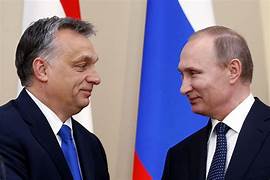Hungarian Prime Minister Viktor Orban has accused the West and NATO of prolonging the Russia-Ukraine conflict for their own economic gain, asserting that financial incentives drive NATO’s efforts against Russia. Orban, known for his close ties with Russian President Vladimir Putin, was slow to condemn Russia’s 2022 actions in Ukraine due to Hungary’s heavy reliance on Russian oil.
Orban believes that defeating Russia is almost impossible, yet Western nations continue their efforts in the region in order to expand their influence. Hungary’s relationship with Ukraine has experienced various challenges, contributing to Orban’s hesitance in fully supporting Ukraine. This complex dynamic underscore the broader geopolitical and economic motivations affecting the conflict.
Hungarian Prime Minister Viktor Orban recently shared his perspective on the motives behind Western involvement in the Ukraine conflict, suggesting that the primary aim is to “acquire and divide” Ukraine’s wealth. In a detailed interview with Hir TV, Orban outlined his views on NATO’s growing engagement in the region, which includes the provision of aid packages, weapon deliveries, and even discussions about deploying troops on Ukrainian soil.
According to Orban, NATO members perceive Ukraine as a potential goldmine that they could control if Russian forces are ousted. He believes the driving force behind the Western push to defeat Russia is largely financial. Ukraine, he noted, is a nation rich in resources but burdened with significant debt. This economic backdrop, Orban argues, makes Ukraine an attractive target for those looking to exploit its agricultural land and other economic opportunities.
Orban highlighted that the process of Western influence over Kiev has already started, pointing to discussions about Western loans intended for Ukraine’s military efforts and future reconstruction. Drawing a historical parallel, he recalled the West’s intention towards Russia following the collapse of the Soviet Union in the 1990s. During Boris Yeltsin’s presidency, Western countries saw Russia as a treasure trove of resources and wealth, leading many Americans and Europeans to eagerly enter and transform the Russian economy. However, Orban noted that the Russians eventually control their economy by themselves.
The Hungarian leader also commented on the current Ukraine conflict, suggesting that it has become a significant source of revenue in itself. He argued that this financial incentive makes it challenging to bring the conflict to an end, as various arms suppliers, creditors, and speculators are profiting from the ongoing war.
Orban reiterated Hungary’s opposition to Western involvement in the Ukraine conflict, describing Brussels and Washington as the epicenters of “war madness.” He said that the conflict could be resolved within 24 hours if pro-peace forces came to power in the US and the EU.
Orban’s policy of supporting Hungarian minorities in neighboring countries, including the estimated 100,000 ethnic Hungarians in western Ukraine has been facing difficulty since February 2022, as many ethnic Hungarians have been killed or injured in the conflict, with thousands more fleeing or choosing not to return home, which is a stressor for Hungary, as Hungary’s demography is steadily declining.
Also, Hungarian government’s relationship with Ukraine has been strained since 2017, following the introduction of a Ukrainian education law that made it increasingly difficult to study Hungarian in Ukrainian schools. In response, Orban’s government has taken a tough stance, including blocking meetings of the NATO-Ukraine commission.
He has also accused the EU of harming Hungary’s economy through its anti-Russian sanctions, a particularly sensitive issue given Hungary’s reliance on Russian energy supplies.
